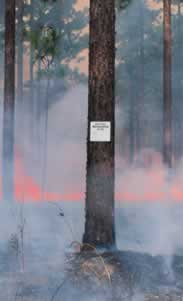
The Natural Georgia Series: The Fire Forest
Longleaf Pine-Wiregrass Ecosystem

 |
The Natural Georgia Series: The Fire ForestLongleaf Pine-Wiregrass Ecosystem |
 |
 The
Joseph W. Jones Ecological Research Center at Ichauway: Dedicated to Research,
Education, and Conservation
The
Joseph W. Jones Ecological Research Center at Ichauway: Dedicated to Research,
Education, and ConservationThe Joseph W. Jones Ecological Research Center at Ichauway is located in Baker County, along 10 miles of the Flint River in southwest Georgia. The Center's mission is to maintain and enhance quality of life within the region through programs of excellence in ecology and natural resource management that include integrated research, conservation, and education goals. The programs are primarily supported by funding from the Robert W. Woodruff Foundation. Center staff members work closely with other organizations such as universities, private nonprofit conservation organizations, and state and federal natural resource agencies.
Ichauway was assembled in 1929 for Robert W. Woodruff as a 29,060-acre quail-hunting plantation. The historical underpinnings for the development of the Jones Center, as well as for the strong emphasis upon combining research, conservation, and educational outreach, originated with a strong conservation ethic for Ichauway. As a precedent, the site was also used to research malaria epidemics and wetland hydrology through the Emory University Field Station from 1939 to 1958.
Robert W. Woodruff Foundation officials researched options for the best use of Ichauway following Mr. Woodruff's death in 1985. They selected the future goals for the Center after reviewing a comprehensive ecological inventory of the property and a series of recommendations from The Nature Conservancy. The Center was named in honor of Joseph W. Jones, Woodruff's long-time associate, former senior vice-president of The Coca-Cola Company, and chairman emeritus of the Woodruff Foundation. By 1993, core staff members were hired in research, forest and wildlife management, and administrative support, and they moved into a newly constructed campus in 1996. There are now more than 100 employees and 25 graduate and undergraduate students from regional universities on-site.
The Jones Center at Ichauway includes approximately 17,000 acres of beautiful, mature longleaf pine woodlands, innumerable depressional wetlands, 25 miles of streams, and 5,000 acres of old-field habitat. These resources represent some of the richest species diversity of the southeastern Coastal Plain. Stewardship and management of these diverse natural resources is the focus of the Center's conservation program.
Research at the Jones Center investigates questions relating to the restoration of longleaf pine ecosystems, conservation biology of rare species, management of mature longleaf pine woodlands to include prescribed burning, and development of economic opportunities through the integration of forest and wildlife management. Other focal points for research include wetland ecology and restoration, and watershed studies integrating land use, water quality, and surface-groundwater interactions.
Today, the Ichauway site is used by the Joseph W. Jones Ecological Research Center as an outdoor laboratory for research, conservation, and restoration of regional ecosystems, as well as an educational demonstration site for ecology and natural resource management. Landowners, land managers, natural resource policy-makers, conservation groups, and affiliated university classes are prioritized outreach constituents. A regional schoolteacher workshop is also conducted annually. Research and conservation activities demonstrated on Ichauway's diversely managed ecosystems provide education and information transfer opportunities. Field demonstrations and workshops often relate to prescribed fire, longleaf pine forest ecology and sustainable management, ecological restoration of threatened ecosystems and wildlife habitat, traditional quail habitat management, threatened and endangered plants and wildlife, wetland protection and management, watershed conservation, and the importance of water resources and aquatic ecosystems of southwest Georgia.
Those interested in learning more about the Center's work could contact the Center by phone at (229) 734-4706; by mail at Route 2, Box 2324, Newton, GA 31770; or through the Center's Web site at www.jonesctr.org.
Read and add comments about this page
Go back to previous page. Go to Fire Forest contents page. Go to Sherpa Guides home.